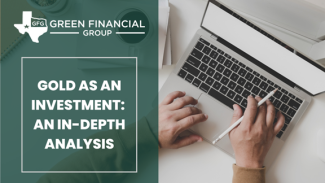
Gold As An Investment: An In-Depth Analysis
The question of whether one should invest in gold has long been a topic of interest among investors worldwide. Despite the rapid advancement of the digital age, gold continues to exert a unique allure that captivates the investment community.
Based on my financial expertise honed over the past two and a half decades, I believe that gold could have a place in a diversified portfolio. However, the decision is not as straightforward as a simple "yes" or "no." Instead, the crucial query we should be asking ourselves is: "How should I own gold?" Several options are available, and the most suitable approach depends on individual circumstances, financial goals, and personal comfort levels with various investment strategies.
Gold Ownership: The Financial Market Route
One method of gold ownership involves participating in financial markets, specifically through the purchase of Exchange Traded Funds (ETFs) that track gold prices. Opting for this approach means investors do not physically possess the gold itself. Instead, they have an investment that mirrors the performance of gold prices. This method appeals to those who prefer consolidated investments, easily accessible through their IRA or non-IRA accounts. It provides a hands-off approach, allowing investors to monitor their investment's daily fluctuations without the need for physical storage or security concerns associated with physical gold.
However, it should be noted that ETFs can potentially have higher costs than purchasing the physical asset of gold and there are Gold ETF fees to consider in your strategy, as well.
Gold Ownership: The Tangible Asset Approach
On the other hand, some investors are attracted to the notion of owning physical gold as a tangible asset. Acquiring gleaming gold coins or sleek gold bars and securely storing them in vaults or safes carries a certain appeal. However, the appeal extends beyond aesthetics, as physical gold can provide a sense of security for many investors.
To purchase physical gold, it is advisable to engage a reputable dealer. It is crucial to understand that when buying or selling physical gold, the transaction price may slightly deviate from the spot price. This characteristic of the physical gold market should be considered during the decision-making process.
There are a few things to keep in mind if owning the tangible asset is something you’re considering:
- Owning gold is not an opportunity to make passive income.
- You will need to ensure you have adequate, safe storage for your gold.
- Recognize that there could possibly be low resale values in your local market.
- From time to time, there may be gold market corrections that affect the value of your gold.
The Balancing Act
Before rushing to acquire gold in any form, it is crucial to remember that, like any investment, balance is key. Feeling secure in your financial plan does not usually come from concentrating all investments in one asset, but rather from diversification across various asset classes, including stocks, bonds, real estate or other types of investment, like gold.
While gold can potentially serve as a hedge against economic uncertainty and inflation, it is not without its risks. Gold prices can be volatile, and although it has generally proven to retain its value over the long term, it does not provide dividends or interest like stocks and bonds. Nonetheless, it can be a valuable component of a balanced, well-rounded and diversified investment strategy.
The Final Nugget
In an era dominated by digital currencies and technology-driven investments, the allure of gold may appear archaic. Yet from ancient civilizations valuing its beauty to modern investors appreciating its stability, gold has remained a constant in an ever-changing world.
Returning to our initial question, "Should I buy gold?" The answer, as one might anticipate, is "It depends." The decision hinges on individual financial goals, risk tolerance, and the level of diversification in one's current portfolio. Gold, whether in physical form or through the financial market, can undoubtedly contribute to an investment strategy. Whether one ultimately chooses to invest in gold or not, the most important aspect is that the decision is well-informed, carefully considered, and aligned with broader financial goals.
---
The information contained in this blog does not purport to be a complete description of the securities, markets, or developments referred to in this material. The information has been obtained from sources considered to be reliable, but we do not guarantee that the foregoing material is accurate or complete. Any opinions are those of the author, and not necessarily those of Raymond James. Expressions of opinion are as of this date and are subject to change without notice. There is no guarantee that these statements, opinions, or forecasts provided herein will prove to be correct.
Every investor's situation is unique and you should consider your investment goals, risk tolerance, and time horizon before making any investment. Investing involves risk and you may incur a profit or loss regardless of the strategy selected. The foregoing is not a recommendation to buy or sell any individual security or any combination of securities. Be sure to contact a qualified professional regarding your particular situation before making any investment or withdrawal decision.
Investing in commodities is generally considered speculative because of the significant potential for investment loss. Their markets are likely to be volatile and there may be sharp price fluctuations even during periods when prices overall are rising.
Gold is subject to the special risks associated with investing in precious metals, including but not limited to: price may be subject to wide fluctuation; the market is relatively limited; the sources are concentrated in countries that have the potential for instability; and the market is unregulated.
ETF shareholders should be aware that the general level of stock or bond prices may decline, thus affecting the value of an exchange-traded fund. Although exchange-traded funds are designed to provide investment results that generally correspond to the price and yield performance of their respective underlying indexes, the funds may not be able to exactly replicate the performance of the indexes because of fund expenses and other factors.
FINRA requires ETF reporting to be standardized. Please provide the 1, 5, and 10 year (or since inception) returns for the ETF as of the most recent calendar quarter end.
Diversification and asset allocation do not ensure a profit or protect against a loss.

